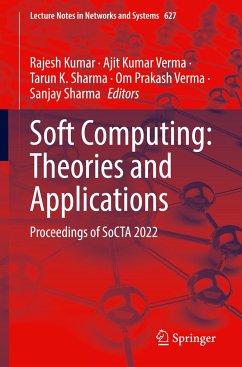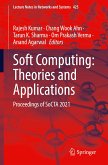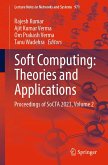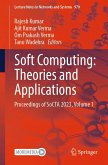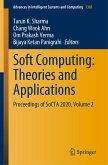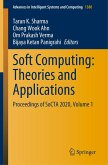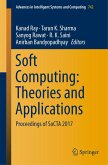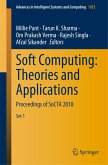Soft Computing: Theories and Applications
Proceedings of SoCTA 2022
Herausgegeben:Kumar, Rajesh; Verma, Ajit Kumar; Sharma, Tarun K.; Verma, Om Prakash; Sharma, Sanjay
Soft Computing: Theories and Applications
Proceedings of SoCTA 2022
Herausgegeben:Kumar, Rajesh; Verma, Ajit Kumar; Sharma, Tarun K.; Verma, Om Prakash; Sharma, Sanjay
- Broschiertes Buch
- Merkliste
- Auf die Merkliste
- Bewerten Bewerten
- Teilen
- Produkt teilen
- Produkterinnerung
- Produkterinnerung
This book focuses on soft computing and how it can be applied to solve real-world problems arising in various domains, ranging from medicine and health care, to supply chain management, image processing and cryptanalysis. It gathers high-quality papers presented at the International Conference on Soft Computing: Theories and Applications (SoCTA 2022), held at University Institute of Technology, Himachal Pradesh University Shimla, Himachal Pradesh, India. The book offers valuable insights into soft computing for teachers and researchers alike; the book inspires further research in this dynamic field. …mehr
Andere Kunden interessierten sich auch für
![Soft Computing: Theories and Applications Soft Computing: Theories and Applications]() Soft Computing: Theories and Applications231,99 €
Soft Computing: Theories and Applications231,99 €![Soft Computing: Theories and Applications Soft Computing: Theories and Applications]() Soft Computing: Theories and Applications186,99 €
Soft Computing: Theories and Applications186,99 €![Soft Computing: Theories and Applications Soft Computing: Theories and Applications]() Soft Computing: Theories and Applications161,99 €
Soft Computing: Theories and Applications161,99 €![Soft Computing: Theories and Applications Soft Computing: Theories and Applications]() Soft Computing: Theories and Applications116,99 €
Soft Computing: Theories and Applications116,99 €![Soft Computing: Theories and Applications Soft Computing: Theories and Applications]() Soft Computing: Theories and Applications169,99 €
Soft Computing: Theories and Applications169,99 €![Soft Computing: Theories and Applications Soft Computing: Theories and Applications]() Soft Computing: Theories and Applications117,99 €
Soft Computing: Theories and Applications117,99 €![Soft Computing: Theories and Applications Soft Computing: Theories and Applications]() Soft Computing: Theories and Applications163,99 €
Soft Computing: Theories and Applications163,99 €-
-
-
This book focuses on soft computing and how it can be applied to solve real-world problems arising in various domains, ranging from medicine and health care, to supply chain management, image processing and cryptanalysis. It gathers high-quality papers presented at the International Conference on Soft Computing: Theories and Applications (SoCTA 2022), held at University Institute of Technology, Himachal Pradesh University Shimla, Himachal Pradesh, India. The book offers valuable insights into soft computing for teachers and researchers alike; the book inspires further research in this dynamic field.
Produktdetails
- Produktdetails
- Lecture Notes in Networks and Systems 627
- Verlag: Springer / Springer Nature Singapore / Springer, Berlin
- Artikelnr. des Verlages: 978-981-19-9857-7
- 1st ed. 2023
- Seitenzahl: 984
- Erscheinungstermin: 25. April 2023
- Englisch
- Abmessung: 235mm x 155mm x 49mm
- Gewicht: 1636g
- ISBN-13: 9789811998577
- ISBN-10: 9811998574
- Artikelnr.: 66981516
- Herstellerkennzeichnung Die Herstellerinformationen sind derzeit nicht verfügbar.
- Lecture Notes in Networks and Systems 627
- Verlag: Springer / Springer Nature Singapore / Springer, Berlin
- Artikelnr. des Verlages: 978-981-19-9857-7
- 1st ed. 2023
- Seitenzahl: 984
- Erscheinungstermin: 25. April 2023
- Englisch
- Abmessung: 235mm x 155mm x 49mm
- Gewicht: 1636g
- ISBN-13: 9789811998577
- ISBN-10: 9811998574
- Artikelnr.: 66981516
- Herstellerkennzeichnung Die Herstellerinformationen sind derzeit nicht verfügbar.
Dr. Rajesh Kumar received the Bachelor of Technology in Engineering degree with honours in Electrical Engineering from the Department of Electrical Engineering, National Institute of Technology, Kurukshetra, India, in 1994, Master of Engineering with honours in Power Engineering from the Department of Electrical Engineering, Malaviya National Institute of Technology, Jaipur, India, in 1997 and Ph.D. degree in Intelligent Systems from Department of Electrical Engineering, Malaviya National Institute of Technology (MREC, University of Rajasthan), India, in 2005. He is currently Professor at Department of Electrical Engineering and Adjunct Professor at Centre of Energy and Environment at Malaviya National Institute of Technology, Jaipur, India. He has been Research Fellow (A) at the Department of Electrical and Computer Engineering at National University of Singapore from 2009-2011. He has been Reader from 2005-2009, Senior Lecturer from 2000-2005 and Lecturer from 1995-2000 at Department of Electrical Engineering, Malaviya National Institute of Technology. He is Founder of ZINE student innovative group. His background is in the fields of computational intelligence, artificial intelligence, intelligent systems, power and energy management, robotics, bioinformatics, smart grid and computer vision. Ajit K. Verma is Professor in the Faculty of Engineering and Natural Sciences, Western Norway University of Applied Sciences, Haugesund, Norway (since March 2012) and has been Professor (since Feb 2001) with the Department of Electrical Engineering at IIT Bombay with a research focus in Reliability and Safety Engineering. He was Director of the International Institute of Information Technology, Pune, on lien from IIT Bombay, from Aug 2009-Sep 2010. He is also Guest Professor at Lulea University of Technology, Sweden. He has supervised/co-supervised 38 Ph.D.s and 95 Masters theses in the area of software reliability, reliable computing,power systems reliability (PSR), reliability centred maintenance (RCM) and probabilistic safety/risk assessment (PSA). He has executed various research projects to promote industry interface and has been course co-ordinator for industry CEPs like reliability engineering, six sigma, software inspections, competency tracking system and software reliability for IT industries. He is Springer Book Series Editor of Asset Analytics-Performance and Safety Management, Fire safety Engineering and Management and Reliable & Sustainable Electric Power and Energy Systems Management and has jointly edited books titled Reliability and Risk Evaluation of Wind Integrated Power Systems(Springer), Reliability Modelling Analysis of Smart Power Systems (Springer) & Current Trends in Reliability, Availability, Maintainability and Safety(Springer) and is Author of books titled Fuzzy Reliability Engineering-Concepts and Applications (Alpha science international - Narosa), Reliability and Safety Engineering (Springer) and Dependability of Networked Computer Based Systems (Springer), Risk Management of Non-Renewable Energy Systems(Springer) and Optimal Maintenance of Large Engineering Systems(Narosa). He has over 250 publications in various journals (over 100 papers) and conferences. He is Senior Member of IEEE and Life Fellow of IETE. He has been Editor-in-Chief of OPSEARCH published by Springer(Jan 2008-Jan 2011) as well as Founder Editor-in-Chief of International Journal of Systems Assurance Engineering and Management (IJSAEM) published by Springer and Editor-in-Chief of Journal of Life Cycle Reliability and Safety Engineering. He is also on the editorial board of several international journals. He was Guest Editor of Special Issue on "Reliable Computing" of International Journal of Automation and Computing (Oct 2007), May 2010, IJSAEM (June 2010) (with Prof Roy Billington and Prof Rajesh Karki) and IJSAEM (March 2011) (with Prof Lotfi A. Zadeh and Prof Ashok Deshpande) and IEEE Transactions on Reliability, March 2011 among others. He was also nominated as Chairman of the "Special Interest Group on System Assurance Engineering and Management' of Berkeley Initiative in Soft Computing" by Prof Lotfi A. Zadeh. Dr. Tarun Kumar Sharma holds Ph.D. in Soft Computing from the Department of Applied Science and Engineering of IIT Roorkee. Since 1 April 2022, he is associated with Shobhit Deemed University, Meerut, as Professor and Head of CSE and Dean - School of Engineering & Technology. Earlier, he worked with Shobhit University Gangoh as Professor and Head of CSE and Dean - School of Engineering & Technology and Amity University Rajasthan as Associate Professor and Head - Department of Computer Science & Engineering / IT as well as Alternate Director - Outcome. He has supervised 4 Ph.D.s, 14 M.Tech. dissertations, several M.C.A. and B.Tech. projects. He has over 80 research publications in his credit. He has been to Amity Institute of Higher Education Mauritius on deputation. He has availed grants from Microsoft Research India, CSIR, New Delhi and DST New Delhi to visit Australia, Singapore and Malaysia, respectively. He is Founding Member of International Conference on Soft Computing: Theories and Applications (SoCTA Series) and Congress on Advances in Materials Science and Engineering (CAMSE). He has edited seven volumes of Conference Proceedings published by AISC series of Springer (SCOPUS) Publication and four edited books with Springer Nature. Dr. Om Prakash Verma is presently associated with Dr. B R Ambedkar National Institute of Technology Jalandhar, Punjab, India, since January 2018 as Assistant Professor in the Department of Instrumentation and Control Engineering. He has almost 11 years of teaching experience. He did his Ph.D. from IIT Roorkee, M.Tech. from Dr. B R Ambedkar NIT Jalandhar and B.E. from Dr. B R Ambedkar University, Agra. He is presently working on ISRO SponsoredProject as PI. He has edited a book on Soft Computing: Theories and Applications and has been Potential Reviewer of several International Journals of high repute. He has published more than 30 research papers in SCI/Scopus/ESI indexed Journals. He has published recently published a paper in Renewable & Sustainable Energy Reviews, (IF: 12.110). He has guided four M.Tech. students and supervising six Ph.D. students. Dr. Sanjay Sharma received B.Tech. degree in Electrical Engineering from Himachal Pradesh University, Shimla, India, in 2007 and M.Tech. degree in Power System from National Institute of Technology, Hamirpur, India, in 2010. He has completed her Ph.D. degree in Department of Electrical Engineering from Punjab Engineering College Deemed to be University, Chandigarh, India, in December 2019. Presently, he is working as Assistant Professor in University Institute of Technology, Himachal Pradesh University, Shimla (H.P), India. He has good research experience in various areas of Electrical Engineering. He worked on a Project "Development and validation of technology for production of high energy density from rice straw and Agri-biomasses (Funding agency PSA, GOI and Sweden). He published 16 research papers in reputed international and national journals, and 18 research papers in international and national conferences. His area of research includes power system, renewable energy, network planning, microgrid, optimization, GIS and machine learning. He has published a number of research papers in various journals and conferences. Presently, his one book on renewable energy has been accepted for Publication in Willey Publication likely to be in market in Dec. 2021. He also granted with one patent and one in progress. He has six-year teaching experience of NITs and government institute. He has delivered expert lecture in various colleges/universities in India. He is Reviewer of various conferences and international journals including Elsevier, Springer, IEEE and Taylor &Francis.
Chapter 1. A CNN-based Approach for Facial Emotion Detection.- Chapter 2. Implementation of Artificial Neural Network for Demanufacturing Operation in the Rail Industry.- Chapter 3. Diversified Recommendation Generation using Graph Convolution Neural Network.- Chapter 4. Brain Tumor detection with GLCM feature extraction and hybrid classification approach.- Chapter 5. Optimization of an inventory model with selling price and stock sensitive demand along with trade credit policy.- Chapter 6. A new family of generalized Euler-Genocchi polynomials associated with Hermite polynomials.- Chapter 7. 6G-Enabled Internet of Medical Things.- Chapter 8. An Inductively Degenerated LNA for ISM Applications: Design & Performance Comparison.- Chapter 9. Prostate Cancer Risk Analysis Using Artificial Neural Network.- Chapter 10. On two bivariate kinds of (p; q)-Euler polynomials.- Chapter 11. Different stages of Watermelon Diseases Detection Using optimized CNN.- Chapter 12. Machine Learning: An Analytical Approach for Pattern Detection in Diabetes.- Chapter 13. A Dynamic Weighted Federated Learning for Android Malware Classification.- Chapter 14. Entropy measure for the linguistic q-rung orthopair fuzzy set.- Chapter 15. Empirical Analysis of Unsupervised Link Prediction Algorithms in Wighted Networks.
Chapter 1. A CNN-based Approach for Facial Emotion Detection.- Chapter 2. Implementation of Artificial Neural Network for Demanufacturing Operation in the Rail Industry.- Chapter 3. Diversified Recommendation Generation using Graph Convolution Neural Network.- Chapter 4. Brain Tumor detection with GLCM feature extraction and hybrid classification approach.- Chapter 5. Optimization of an inventory model with selling price and stock sensitive demand along with trade credit policy.- Chapter 6. A new family of generalized Euler-Genocchi polynomials associated with Hermite polynomials.- Chapter 7. 6G-Enabled Internet of Medical Things.- Chapter 8. An Inductively Degenerated LNA for ISM Applications: Design & Performance Comparison.- Chapter 9. Prostate Cancer Risk Analysis Using Artificial Neural Network.- Chapter 10. On two bivariate kinds of (p; q)-Euler polynomials.- Chapter 11. Different stages of Watermelon Diseases Detection Using optimized CNN.- Chapter 12. Machine Learning: An Analytical Approach for Pattern Detection in Diabetes.- Chapter 13. A Dynamic Weighted Federated Learning for Android Malware Classification.- Chapter 14. Entropy measure for the linguistic q-rung orthopair fuzzy set.- Chapter 15. Empirical Analysis of Unsupervised Link Prediction Algorithms in Wighted Networks.

